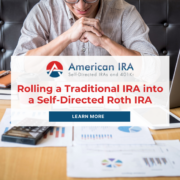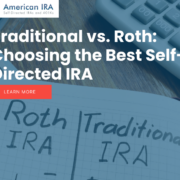5 Reasons to Consider a Self-Directed Traditional IRA
If you’re looking to save for retirement, you may be wondering which type of IRA is right for you. Traditional IRAs are a popular choice, and have been for decades. But some investors may regard them as outdated compared to another option, Roth IRAs. But are they? And have you considered a Self-Directed Traditional IRA? Here are five reasons why you should:
Reason #1 to Consider a Self-Directed Traditional IRA: Tax Deductions
One of the biggest advantages of a Traditional IRA is the tax deduction you can receive. Contributions made to your Traditional IRA can be tax-deductible, meaning you can lower your taxable income for the year. This can be a great benefit for those looking to reduce their tax bill in the short-term. The amount you can contribute is based on your income and age, so it’s important to consult with a financial advisor to ensure you’re contributing the maximum amount.
Reason #2 to Consider a Self-Directed Traditional IRA: Compound Interest
Another advantage of a Traditional IRA is the power of compound interest. With compound interest, your money can grow exponentially over time. This can lead to significant gains in your retirement account, especially if you start contributing early. Albert Einstein reportedly said that compounding returns are one of the marvels of the universe. He must have known his stuff.
Reason #3 to Consider a Self-Directed Traditional IRA: Flexibility
A Self-Directed Traditional IRA offers flexibility in terms of investment options. With a Self-Directed IRA, you can invest in a wide range of assets, including stocks, bonds, mutual funds, and real estate. This can help you diversify your portfolio and potentially earn higher returns. However, it’s important to note that investing in alternative assets can come with risks, so it’s important to do your due diligence and consult with a financial advisor before making any investments.
Reason #4 to Consider a Self-Directed Traditional IRA: Lower Taxes in Retirement
While contributions to a Traditional IRA are tax-deductible, you will have to pay taxes on your withdrawals in retirement. However, many people find themselves in a lower tax bracket in retirement than they were during their working years. This means that you could end up paying less in taxes on your withdrawals than you would have on your contributions. Additionally, you may be eligible for other tax benefits in retirement, such as the tax credit for the elderly or disabled. Consult with a tax professional for more advice in this regard.
Reason #5 to Consider a Self-Directed Traditional IRA: Estate Planning
Finally, Self-Directed Traditional IRAs can be a useful tool for estate planning. Traditional IRAs allow you to name a beneficiary, meaning that your assets can pass directly to your loved ones upon your passing. Additionally, a Self-Directed IRA can allow for greater control over how your assets are distributed, ensuring that your wishes are carried out. This can be especially important if you have specific wishes for how your assets are distributed or if you want to minimize taxes and fees for your beneficiaries.
A Self-Directed Traditional IRA can offer numerous benefits over the conventional approach to retirement investing. From tax deductions and compound interest to investment flexibility and estate planning, Self-Directed Traditional IRAs can be a powerful tool in your retirement planning. However, it’s important to note that a Self-Directed IRA includes additional risks and responsibilities. Before making any decisions, it’s important to consult with a financial advisor to determine if a Self-Directed Traditional IRA is right for you.
Interested in learning more about Self-Directed IRAs? Contact American IRA, LLC at 866-7500-IRA (472) for a free consultation. Download our free guides or visit us online at www.AmericanIRA.com.










